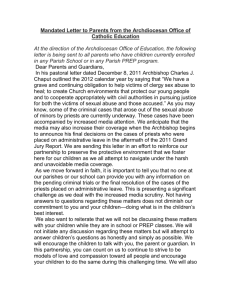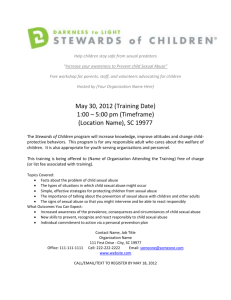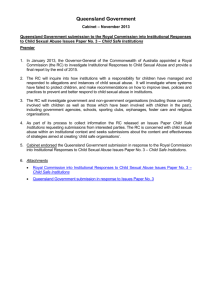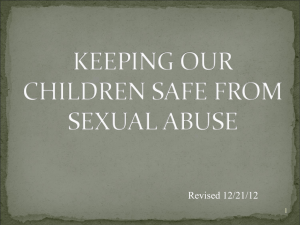General Medical Officer (GMO) Manual: Clinical Section
advertisement
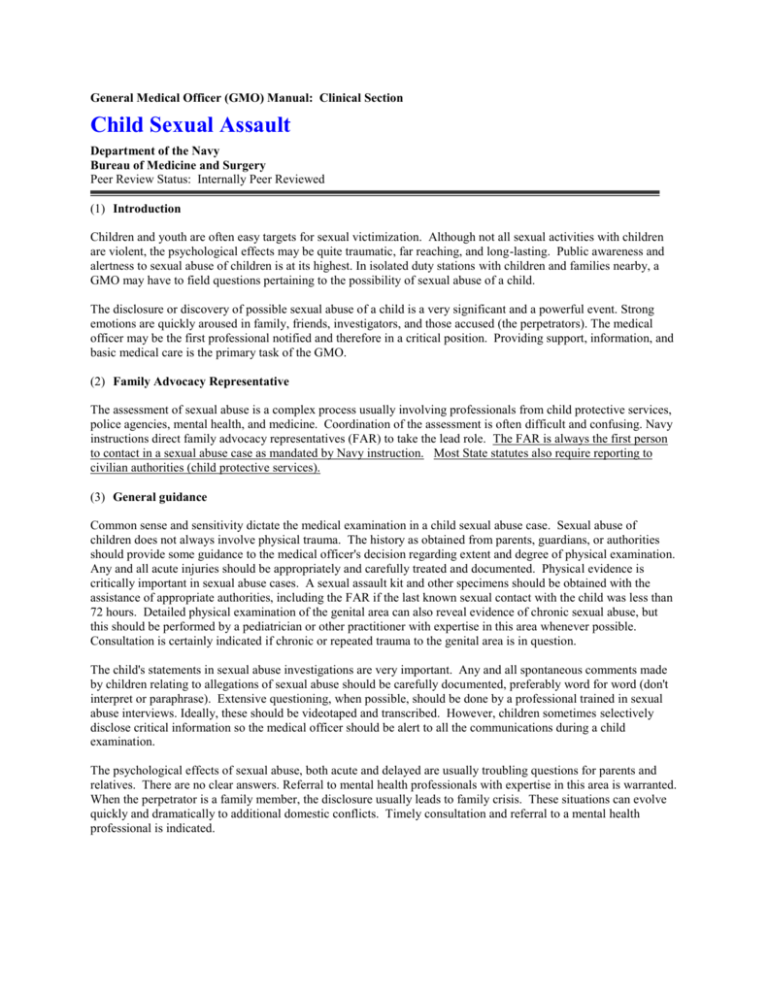
General Medical Officer (GMO) Manual: Clinical Section Child Sexual Assault Department of the Navy Bureau of Medicine and Surgery Peer Review Status: Internally Peer Reviewed (1) Introduction Children and youth are often easy targets for sexual victimization. Although not all sexual activities with children are violent, the psychological effects may be quite traumatic, far reaching, and long-lasting. Public awareness and alertness to sexual abuse of children is at its highest. In isolated duty stations with children and families nearby, a GMO may have to field questions pertaining to the possibility of sexual abuse of a child. The disclosure or discovery of possible sexual abuse of a child is a very significant and a powerful event. Strong emotions are quickly aroused in family, friends, investigators, and those accused (the perpetrators). The medical officer may be the first professional notified and therefore in a critical position. Providing support, information, and basic medical care is the primary task of the GMO. (2) Family Advocacy Representative The assessment of sexual abuse is a complex process usually involving professionals from child protective services, police agencies, mental health, and medicine. Coordination of the assessment is often difficult and confusing. Navy instructions direct family advocacy representatives (FAR) to take the lead role. The FAR is always the first person to contact in a sexual abuse case as mandated by Navy instruction. Most State statutes also require reporting to civilian authorities (child protective services). (3) General guidance Common sense and sensitivity dictate the medical examination in a child sexual abuse case. Sexual abuse of children does not always involve physical trauma. The history as obtained from parents, guardians, or authorities should provide some guidance to the medical officer's decision regarding extent and degree of physical examination. Any and all acute injuries should be appropriately and carefully treated and documented. Physical evidence is critically important in sexual abuse cases. A sexual assault kit and other specimens should be obtained with the assistance of appropriate authorities, including the FAR if the last known sexual contact with the child was less than 72 hours. Detailed physical examination of the genital area can also reveal evidence of chronic sexual abuse, but this should be performed by a pediatrician or other practitioner with expertise in this area whenever possible. Consultation is certainly indicated if chronic or repeated trauma to the genital area is in question. The child's statements in sexual abuse investigations are very important. Any and all spontaneous comments made by children relating to allegations of sexual abuse should be carefully documented, preferably word for word (don't interpret or paraphrase). Extensive questioning, when possible, should be done by a professional trained in sexual abuse interviews. Ideally, these should be videotaped and transcribed. However, children sometimes selectively disclose critical information so the medical officer should be alert to all the communications during a child examination. The psychological effects of sexual abuse, both acute and delayed are usually troubling questions for parents and relatives. There are no clear answers. Referral to mental health professionals with expertise in this area is warranted. When the perpetrator is a family member, the disclosure usually leads to family crisis. These situations can evolve quickly and dramatically to additional domestic conflicts. Timely consultation and referral to a mental health professional is indicated. (4) Summary The protection of dependent children who are abused, neglected, or abandoned has become a high priority for the Department of the Navy. The Family Advocacy Program established in 1979, has the responsibility and authority to assist commands and the Medical Department in all child abuse cases. The family advocacy representative at your command is the best resource. For questions concerning medical aspects of suspected child maltreatment, the following consultative service is available; The Armed Forces Center for Child Protection National Naval Medical Center, Bethesda, Maryland Commercial: (301) 295-4100 DSN: 295-4100 Toll-free CONUS: (877) 295-4100 Toll-free OCONUS: (877) 270-2492 FAX: (301) 295-2657 Reference (a) OPNAVINST 1752.2. Revised by CAPT Barbara R. Craig, MC, USN, Medical Consultant for Child Abuse and Neglect, The Armed Forces Center for Child Protection, National Naval Medical Center, Bethesda, MD (1999).

